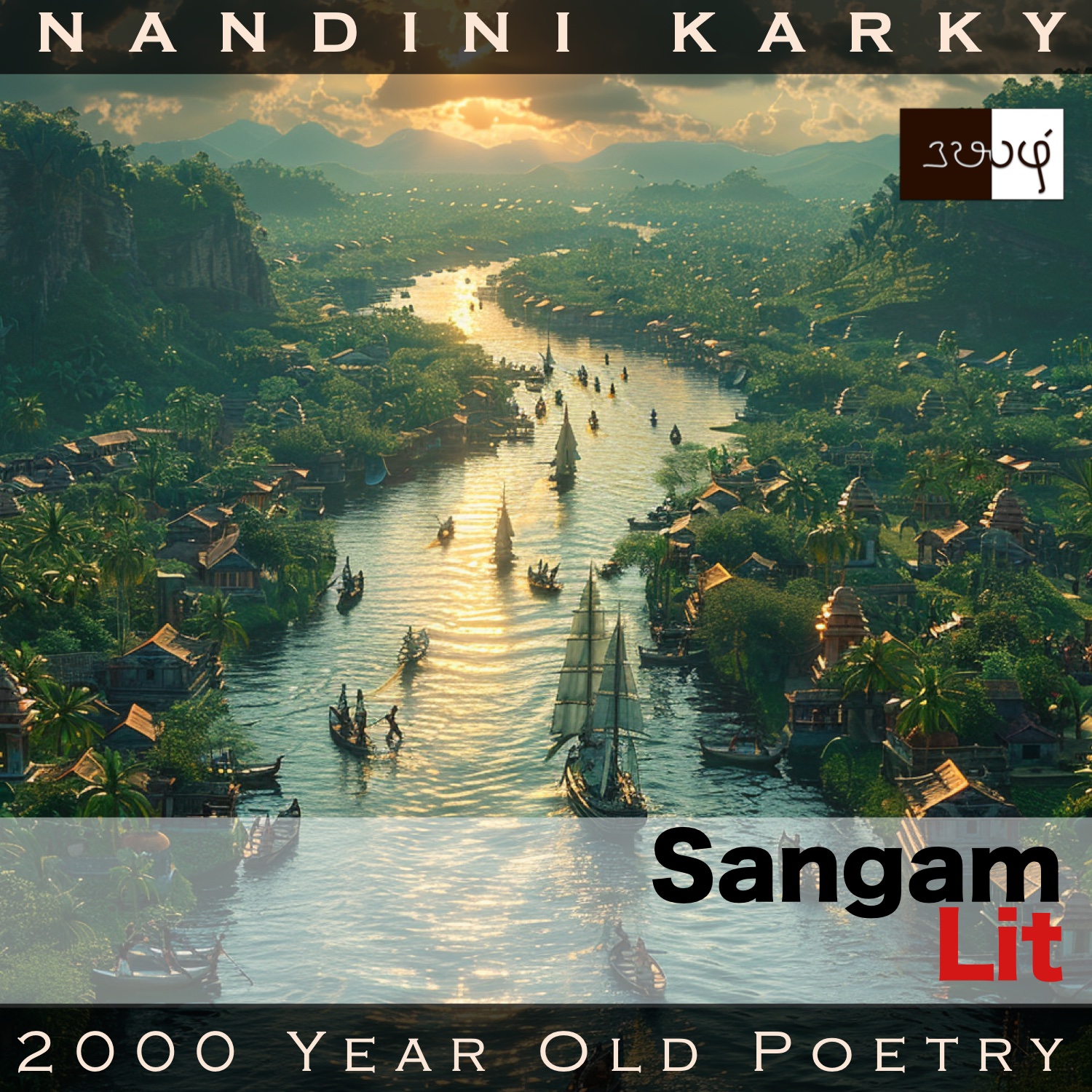Podcast: Play in new window | Download
Subscribe: Apple Podcasts | Spotify | Amazon Music | Android | iHeartRadio | Email | TuneIn | RSS | More
In this episode, we perceive the riches of an ancient town, as depicted in Sangam Literary work, Puranaanooru 343, penned by the poet Paranar. Set in the category of ‘Kaanji Thinai’ or ‘Defence’, the verse laments a war that is about to commence.

மீன் நொடுத்து நெல் குவைஇ,
மிசை அம்பியின் மனை மறுக்குந்து,
மனைக் குவைஇய கறி மூடையால்,
கலிச் சும்மைய கரை கலக்குறுந்து;
கலம் தந்த பொற் பரிசம்
கழித் தோணியான், கரை சேர்க்குந்து;
மலைத் தாரமும் கடல் தாரமும்
தலைப் பெய்து, வருநர்க்கு ஈயும்
புனல்அம் கள்ளின் பொலந்தார்க் குட்டுவன்
முழங்குகடல் முழவின் முசிறி அன்ன,
நலம்சால் விழுப்பொருள் பணிந்துவந்து கொடுப்பினும்,
புரையர் அல்லோர் வரையலள், இவள்’ எனத்
தந்தையும் கொடாஅன் ஆயின் – வந்தோர்,
வாய்ப்பட இறுத்த ஏணி ஆயிடை
வருந்தின்று கொல்லோ தானே – பருந்து உயிர்த்து
இடைமதில் சேக்கும் புரிசை,
படைமயங்கு ஆரிடை நெடுநல் ஊரே?
The prolific historian poet Paranar throws light on another instance of conflict arising owing to the refusal of a maiden’s hand in a verse filled with fascinating details. His words can be translated as follows:
“Mounds of paddy on a fast boat, obtained by bartering fish, confuse with the appearance of a house; Sack loads of pepper heaped in a house, confuse with the appearance of the wave-resounding shore; Huge golden wares from ships are brought ashore via rafts plying through the backwaters; Rendering the produce of the mountain and the produce of the sea to those who come seeking, Kuttuvan, who wears a golden garland, shells out toddy, akin to a beautiful wild stream, in his town of Musiri, with a roaring ocean, resounding like a drum. Even if immense wealth like that of this town is given humbly, her father declares, ‘She shall not marry anyone other than the greatest of men’, and refuses to offer her hand. And so, those who come seeking her, want to break and enter her father’s fort, where eagles sigh midway, around the town with paths brimming with soldiers preparing for battle in this fine and great town. The ladders placed on fort walls to this end seem to be slanted in sorrow!”
Let’s delve into the details presented. The poet zooms on to an ancient boat and points to the huge mounds of paddy which have been obtained by bartering fish from the seas, and says that it confuses the viewer as to whether that water vessel is a boat or a house. Next, he moves on to sacks of pepper that are heaped in a house and says that sight makes one wonder if one is seeing a mere house or the sand-filled shore near the loud sea. Next, he turns his attention to the huge golden wares that have arrived in ships from nations many, which are now being brought through the backwaters inshore. From these events happening around, the poet moves on to a personality, King Kuttuvan, a title rendered to Chera Kings in ancient times, and says this garland-clad king renders the riches of the mountains and the seas to those who come seeking to him, and not only that, toddy flows like water, in his great town of Musiri, the poet adds.
Now, the poet connects saying even if copious amounts of wealth like that of the town of Musiri is given, and that too with humility, even then, the girl’s father would say, ‘She will marry no one but the greatest of men’. So, angered, all those leaders who came seeking her hand decide to wage war on the girl’s father. As the town bustles with soldiers preparing to defend the fort walls on which resting eagles sigh, those enemy kings throw the ladders on those walls in an attempt to breach it. Here, the poet steps back from the scene and concludes with the comment that even those ladders seem to be worrying about the battle and ruin that will follow, as they lie slanted on those fort walls!
What an exquisite thought of projecting the worry about war on that inanimate object! A face that is crestfallen in worry appears in the place of that ladder leaning on the fort wall in the mind of this laudable poet, who yet again laments the outbreak of war. Reverting back to his mention of that rich town of Musiri, which has been found to be located on the coast of Kerala, where there’s everything you can ask for- be it the fish of the seas, paddy from the fields, pepper from the mountains, and gold that nations are willing to shell out for that pepper- it should be noted that the truth of this verse is vouched in the mention of this town in Greek and Roman literature from the ancient era such as ‘Periplus of the Erythraean Sea’, Pliny’s ‘Natural History’ and many other maps and documents from that era. The idea of gold being showered upon for this natural resource of pepper shouts out the importance of this plant to ancient people, and by extension, the wealth of that town of ‘Muziris’ and that entire region in South India. Because it’s strongly supported by multiple sources from the past, this verse is a case in point that the events and details mentioned in Sangam literature arise not from the imagination of poets but from life as it was then, something which reiterates the truth of what a treasure these living verses from the past are!




Share your thoughts...